-
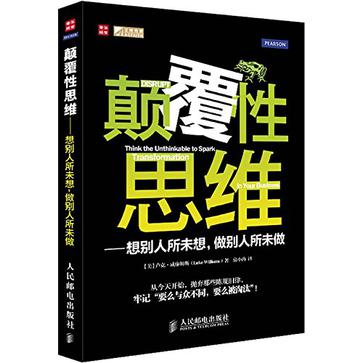
颠覆性思维
内容介绍:本书作者凭借其在国际顶级创新型设计公司中多年的工作经验,向读者介绍了五步颠覆性创意法则:第一步,指导你突破常规,提出颠覆性假设;第二步,针对假设发现颠覆性商机;第三步,将诱人的商机转化为切实可行的颠覆性创意;第四步,经目标市场检验后,整合创意形成颠覆性解决方案;第五步,以颠覆性方式演示方案,说服投资者。书中观点独到,配有大量潮流新锐的案例,五步思维法简单易学,可以帮助读者重新审视周围那些被忽略的事物,设计出颠覆性的市场方案。 本书是企业产品和服务开发设计者、市场营销部人员、广告业从业者必读的思维开发教程,同时也是任何一位希望突破传统思维、保持理念的读者的必备攻略。 -
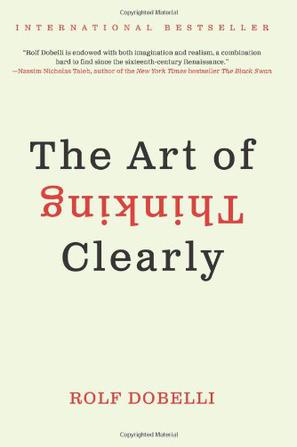
The Art of Thinking Clearly
Have you ever . . . Invested time in something that, in hindsight, just wasn't worth it? Paid too much in an eBay auction? Continued to do something you knew was bad for you? Sold stocks too late, or too early? Taken credit for success, but blamed failure on external circumstances? Backed the wrong horse? These are examples of what the author calls cognitive biases, simple errors all of us make in day-to-day thinking. But by knowing what they are and how to identify them, we can avoid them and make better choices: whether in dealing with personal problems or business negotiations, trying to save money or earn profits, or merely working out what we really want in life—and strategizing the best way to get it. Already an international bestseller, The Art of Thinking Clearly distills cutting-edge research from behavioral economics, psychology, and neuroscience into a clever, practical guide for anyone who's ever wanted to be wiser and make better decisions. A novelist, thinker, and entrepreneur, Rolf Dobelli deftly shows that in order to lead happier, more prosperous lives, we don't need extra cunning, new ideas, shiny gadgets, or more frantic hyperactivity—all we need is less irrationality. Simple, clear, and always surprising, this indispensable book will change the way you think and transform your decision making—at work, at home, every day. From why you shouldn't accept a free drink to why you should walk out of a movie you don't like, from why it's so hard to predict the future to why you shouldn't watch the news, The Art of Thinking Clearly helps solve the puzzle of human reasoning. -

Blink
Intuition is not some magical property that arises unbidden from the depths of our mind. It is a product of long hours and intelligent design, of meaningful work environments and particular rules and principles. This book shows us how we can hone our instinctive ability to know in an instant, helping us to bring out the best in our thinking and become better decision-makers in our homes, offices and in everyday life. Just as he did with his revolutionary theory of the tipping point, Gladwell reveals how the power of blink' could fundamentally transform our relationships, the way we consume, create and communicate, how we run our businesses and even our societies.You'll never think about thinking in the same way again. -
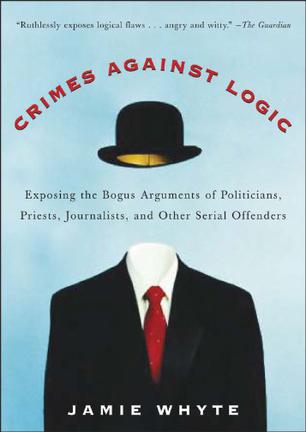
Crimes Against Logic
This is a witty assault on lame rhetoric, specious logic, and official BS. Here's a fast-paced, ruthlessly funny romp through the mulligan stew of illogic, unreason, and just plain drivel served up daily in the media by pundits, psychics, ad agencies, New Age gurus, statisticians, free trade ideologues, business "thinkers," and, of course, politicians. Award-winning young philosopher Jamie Whyte applies his laser-like wit to dozens of timely examples in order to deconstruct the rhetoric and cut through the haze of shibboleth and doubletalk to get at the real issues. A troubleshooting guide to both public and private discourse, "Crimes Against Logic": analyzes the 12 major logical fallacies, with examples from the media and everyday life; takes no prisoners as it goes up against the scientific, religious, academic, and political establishments; helps you fine-tune your critical faculties and learn to skewer debaters on their own phony logic. -
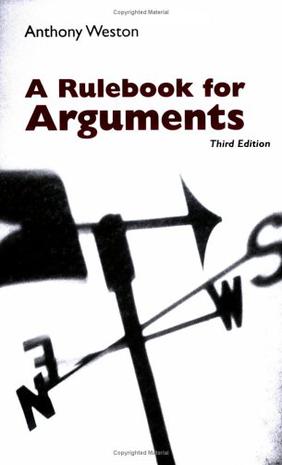
A Rulebook for Arguments
-
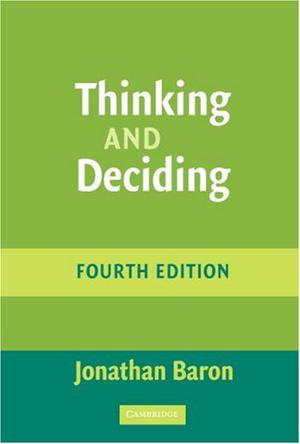
Thinking and Deciding
Beginning with its first edition and through subsequent editions, Thinking and Deciding has established itself as the required text and important reference work for students and scholars of human cognition and rationality. In this, the fourth edition, Jonathan Baron retains the comprehensive attention to the key questions addressed in the previous editions - How should we think? What, if anything, keeps us from thinking that way? How can we improve our thinking and decision making? - and his expanded treatment of topics such as risk, utilitarianism, Baye's theorem, and moral thinking. With the student in mind, the fourth edition emphasises the development of an understanding of the fundamental concepts in judgement and decision making. This book is essential reading for students and scholars in judgement and decision making and related fields, including psychology, economics, law, medicine, and business.